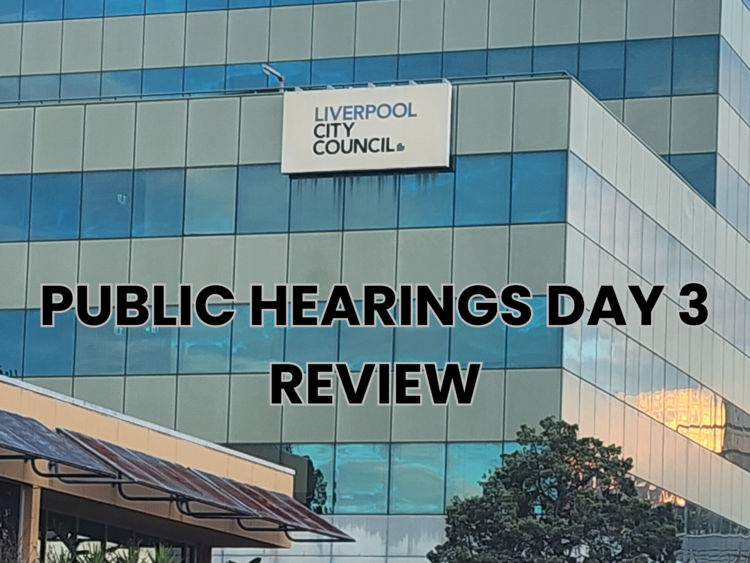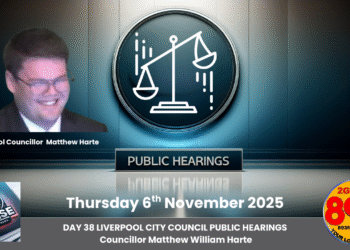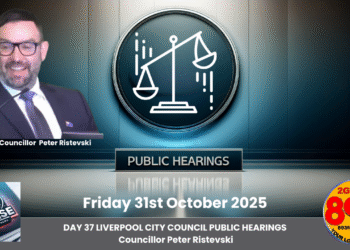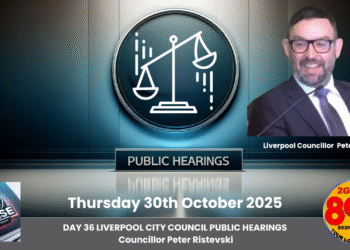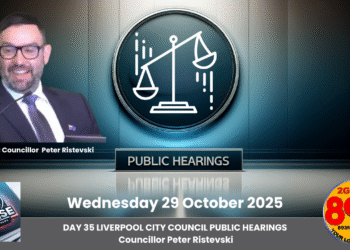The primary focus of Day 3 was the testimony of Mr Farooq Portelli, current Director of Corporate Services at Liverpool City Council and former General Manager (also referred to as Chief Executive Officer). Mr Portelli’s evidence provided a detailed account of his employment history with the council, spanning over a decade, and the circumstances surrounding his termination in 2014—a matter of significant interest to ratepayers concerned about leadership stability and associated costs.
Mr Portelli began working at Liverpool City Council in 2004 as Chief Financial Officer, shortly after the council was placed into administration. With prior experience at Hawkesbury City Council, Swan Hill City Council, Swan Hill Water Board in Victoria, and a 10-year stint at the Department of Local Government in NSW, he brought substantial expertise to the role. He progressed to Director of Corporate Services in 2007 and was appointed Acting General Manager in July 2010, officially confirmed as General Manager on 2 September 2010 under a five-year standard contract set by the Department of Local Government.
Mr Portelli’s testimony revealed deep tensions with Mayor Ned Mannoun, elected in September 2012, which culminated in attempts to terminate his employment. A pivotal issue arose from Portelli’s decision to dismiss a Director of Planning, Mr Matt Daniels, after discovering Daniels was a declared bankrupt (SMH Article)—a status that legally barred him from holding a senior staff position under the Local Government Act. Despite seeking external legal advice and confirming with the Department of Local Government that Daniels could not be employed, Mayor Mannoun opposed the dismissal, valuing Daniels’ performance. This disagreement strained their relationship, as Portelli noted, “The mayor was not happy with that.”
Thursday AM Stream Linked Below (starting time 08:25)
Costly Terminations and Use of Public Funds
On 18 December 2013, a mayoral minute proposed Portelli’s termination during a closed council session the inquiry heard, but a lack of quorum due to councillors leaving the chamber adjourned the meeting to 23 December. Portelli submitted a complaint to the Office of Local Government (OLG) on 18 December, initially treated as a Public Interest Disclosure (PID) with temporary protections against victimisation. However, the OLG later determined it wasn’t a PID matter, and on 26 March 2014, the council resolved to terminate his employment under the “without-cause” provision, entailing a payment of 38 weeks’ salary as per his contract. Portelli, anticipating ongoing conflict and media coverage in local papers like the Liverpool Leader and Liverpool Champion, approached the mayor to negotiate an amicable departure, stating to councillors, “I ask you to support it because I would prefer to leave on a positive note rather than continue under the current circumstances.” His employment officially ended on 1 July 2014, though he was on leave with accumulated entitlements until then. This payout, documented in a deed of release, represents yet another instance of significant termination costs borne by ratepayers, echoing concerns from Day 1 about financial management.
Governance and Transparency
The process of Portelli’s termination, driven by a mayoral minute and marked by closed sessions where quorum issues delayed decisions, raises questions about transparency and the influence of personal conflicts on council operations. Media reports from the Daily Telegraph (27 March 2014) noted mixed reactions among councillors, with some like Anne Stanley expressing frustration over the handling, stating, “The hypocrisy that was going on about a person that we wanted to sack was more than I could stomach.” For residents, this suggests potential dysfunction within the governing body, impacting effective decision-making for our community.
Thursday PM Stream Linked Below (starting time 16:00)
Moreover, the lack of transparency in closed sessions and the use of mayoral minutes to push significant decisions like terminations highlight governance issues. Residents should question whether such mechanisms serve the public interest or exacerbate dysfunction within our council, potentially affecting strategic planning and service delivery.
What’s Next for the Inquiry?
Mr Farook Portelli returns to give further evidence on Monday starting at 10am
The scheduled appearances for next week are subject to change.

We urge all residents to stay informed via the inquiry’s live stream or transcripts available online. This process is vital for holding our council accountable and ensuring it prioritises our community’s needs. We continue to stream the hearings each week day next week on our Facebook page www.facebook.com/localnewspulse, we welcome your feedback or experiences with council services—your voice matters in shaping this narrative.
Don’t forget to tune in to 89.3 FM or www.893fm.com.au every Thursday at 9am with Michael and BJ on The Pulse for the latest local news and updates on these hearings.
Other Articles of Interest Liverpool Leader









